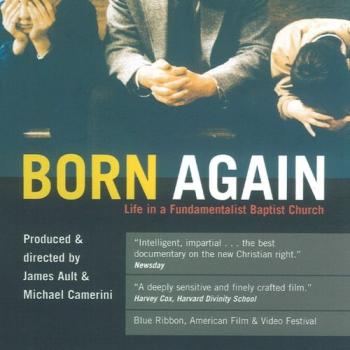On the Other Hand: Some “Views from Somewhere” (Metaphysical Views of Reality) Are Destined to Die Out
This blog post is, in a sense, “Part 2” of the immediately preceding one (“The Myth of Secular Reasoning,” April 2018). It does not constitute any contradiction of anything I said there; it is simply a correction to anyone who misinterpreted that essay as affirming relativism or that all world perspectives are equally valid.
As I see it (my view from somewhere), there are two tests of a world perspective (vision of what constitutes ultimate reality). (Everyone has one whether they know it or admit it or not.)
The first is the law of non-contradiction; insofar as a world perspective, based on a set of unprovable assumptions about reality (and non-reality), contradicts itself it is weak and probably will eventually die out due to that inner logical weakness. Or, if it does not die out, it will be viewed by most people as so “quirky” as to be largely ignored, not taken seriously.
The second is explanatory power; insofar as a world perspective fails to account for the lived experience of human beings it is weak and will probably eventually die out (or undergo modification) due to that inner weakness.
*Sidebar: The opinions expressed here are my own (or those of the guest writer); I do not speak for any other person, group or organization; nor do I imply that the opinions expressed here reflect those of any other person, group or organization unless I say so specifically. Before commenting read the entire post and the “Note to commenters” at its end.*
Examples always illuminate a point. There is an American-based religion founded in the 19th century that teaches that “sin, sickness, death” are illusory in the sense that they arise from belief in them. (I know much about this religion and I know there is some diversity of belief within it, so I am simply going by what I have read in its original sources as well as in some of its major proponents and people I know who have been its adherents for many years. If someone wishes to claim that is not what it teaches, well, all I can say is that it is what many of its adherents believe. It is their “view from somewhere.”)
This religion teaches that it is possible for a human being to live entirely free from sin, sickness, and death by right thinking (which they call prayer). In other words, if a person could free himself or herself from belief in sin, sickness, and death, they would be free from those common human experiences.
This religion thrived for a long time in America; it rode a wave of popular optimism about positive thinking and its benefits. On the other hand, it suffered much ridicule including, near the time of its origin, from leading American writers, pundits, commentators. However, it was so large and influential that, for many years, its adherents were free from prosecution if sick, vulnerable people under their care were treated by its practitioners instead of taken to medical doctors. Even parents of children who died without ever seeing a doctor were protected by many states’ laws that exempted them from taking their children to medical doctors (or osteopaths, etc.). In recent decades most of those laws have been overturned and some parents of children who died were prosecuted.
But the legal issue is not directly relevant to my point here. My point here is that of lack of explanatory power. This religion, which considers itself the true form of Christianity but has widely been regarded as unorthodox by Christian scholars (from their perspective), has apparently dwindled much in size and influence due to its inability to explain why all of its adherents become terminally sick and die. To date, so far as I am aware, no member or adherent of that religion has become immortal without going through bodily death. In other words, in spite of its teachings, beliefs, world perspective, practices, etc., all of its followers eventually die.
That religion does not publish membership statistics for outsiders, but most scholarly observers of American religion believe it is slowly shutting down. It used to have “Reading Rooms” in airports and on “Main Streets” of towns and cities. One hardly sees them anymore. I have personally observed many of its churches closing. One educated guess put its number of adherents in the United States—at its peak of popularity—somewhere around half a million. Most scholarly observers would now suggest that number has fallen very considerably.
My belief (from my view from somewhere) is that this religion, like many others of the past, will eventually die out entirely unless its leaders redefine its belief system to account for the undeniable fact that all of its even most passionate adherents die. Many may recover from illness with the help of one of its practitioners, but those nevertheless go on to die.
I could give other examples of world perspectives, views from somewhere (about reality), that suffer fatally, eventually, from one or another of these two commonly used tests for viability. I will dare to suggest that both of them are not the result of the Enlightenment or the rise of modern philosophy and science but have always been intuitive to most mature, thoughtful people. A belief system about the nature of reality will eventually either die away or adjust itself to overcome these weaknesses insofar as it suffers from them.
As a Christian scholar I continually apply these two tests to my own “view from somewhere”—perspective about reality.
Underlying what I am saying here is my embrace of what Catholic theologian Hans Küng called “critical rationality” (not “critical rationalism” which he rejects). Critical rationality means that all truth claims must be open to correction. How? That is where I have found Küng less helpful than some other thinkers.
I happen to believe that the law of non-contradiction and the law of explanatory power are intuitive to humanity even if they are often ignored for whatever reason. What I mean by “non-contradiction” should be clear; “explanatory power” takes more unpacking. Let me put it as simply as possible: Insofar as a belief system about the nature of reality cannot explain, cannot account for, common human experience, it is vulnerable to falsification and will eventually change or die away.
Now, someone who reads this far will claim that I am now contradicting what I wrote earlier—in “Part 1” of this two part essay. They will claim that my two tests constitute or arise from my particular “view from somewhere” and are unprovable. Someone will claim, I’m sure, that these two tests constitute “secular reasoning.” I disagree; I would call them two tests of universal human reasoning. They are purely negative and have no ability, by themselves, to constitute a whole metaphysical perspective on reality. Assuming them, working with them, however, is necessary to avoid the rise and influence of simply incredible belief-claims about the nature of reality. However, I am not claiming they should be imposed on people—except perhaps in a court of law. Without these two tests “reasonable doubt” is meaningless.
A couple years ago I was on a jury pool in a criminal case. I did not pass voir dire and so did not serve on the actual jury when the trial began. I was dismissed—along with most of the other members of the jury pool. One of the things that dismayed me most was the judge’s instructions to the potential jurors. He said (paraphrasing) that there is no standard definition of “reasonable doubt” and that it is up to each individual juror to decide what constitutes reasonable doubt. He did not even attempt to pin doubt “reasonable doubt” more helpfully. As I said, I was dismayed. As I looked around the jury pool of which I was a part I thought most of the people there probably had no idea what “reasonable doubt” means and would possibly be corrupted in their decision making by emotion, rhetoric, prejudice, etc.
So now, someone will object that I have just contradicted myself because earlier (above) I claimed my two tests are universal and intuitive. My response is that I believe if the judge had explained my two tests of right (or wrong) belief about reality to the potential jurors they would have said (even if only to themselves”)something like “Oh, yes, that makes sense. I should have thought of that myself.” In other words, when I say “intuitive” I don’t mean everyone is already conscious of these two tests but that when they are explained to them they will (unless being obstinate) say “Yes, I understand, that is correct.”
Now, these two tests do not by themselves constitute enough “material” to build up a metaphysical world-perspective. They are purely and simply negative tests. And they are not tied to any metaphysical world-perspective but are implicit in all serious human thought about beliefs about reality but sometimes need to be drawn out for people to acknowledge them as valid.
*Note to commenters: This blog is not a discussion board; please respond with a question or comment only to me. If you do not share my evangelical Christian perspective (very broadly defined), feel free to ask a question for clarification, but know that this is not a space for debating incommensurate perspectives/worldviews. In any case, know that there is no guarantee that your question or comment will be posted by the moderator or answered by the writer. If you hope for your question or comment to appear here and be answered or responded to, make sure it is civil, respectful, and “on topic.” Do not comment if you have not read the entire post and do not misrepresent what it says. Keep any comment (including questions) to minimal length; do not post essays, sermons or testimonies here. Do not post links to internet sites here. This is a space for expressions of the blogger’s (or guest writers’) opinions and constructive dialogue among evangelical Christians (very broadly defined).















